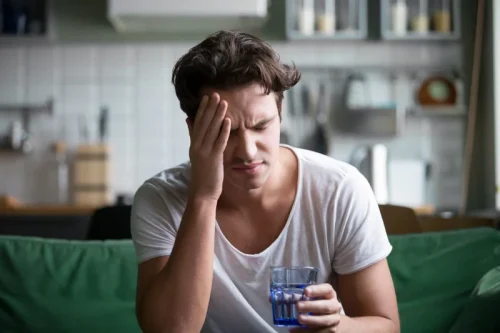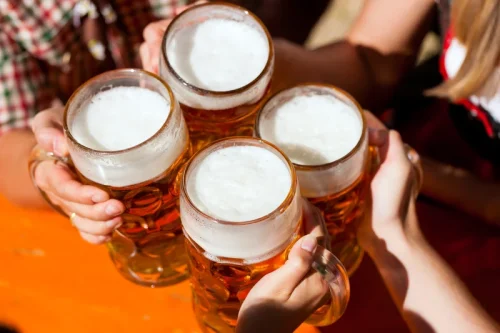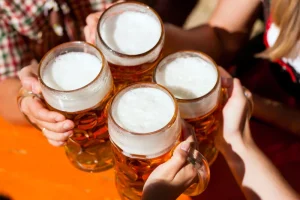Hangover Best Cures, How Long Hangover Lasts, & FAQs

“Pain relievers like acetaminophen, antidepressants, cholesterol medication, and blood pressure medications are ones you want to be especially careful with,” says Dr. Cox. Your body’s already under a little bit of strain during your period, and since alcohol can dehydrate you, it can deplete your energy even more on your period, says Dr. Cox. Dr. Braid describes this as “the perfect drink the day after a big night out.” While it is not the answer people will want to hear, Dr. Basford believes “prevention really is the best cure”, although, she added there are some other measures to consider if the hangover has already hit. “In addition, many people drink less, and less regularly, as they get older, and so when they do have a big night on the booze, they tolerate it much less well.”
- Experiments have shown that clear liquors, such as vodka and gin, tend to cause hangovers less frequently than dark ones, such as whiskey, red wine, and tequila.
- At The I.V. Doc, we are familiar with the discomfort that can be caused by hangovers, which is why we crafted this guide on how long a hangover lasts and traced some of our most effective hangover remedies.
- Generally speaking, the more congeners an alcohol has, the worse the hangover is likely to be.
When to see a doctor

If you are particularly predisposed to hangovers, it may be worthwhile to experiment with alcohols that have low congener content, such does a hangover last all day as beer, vodka, and white wine. A good rule of them is that the lighter the spirit is, the fewer congeners it has. The single best prevention against the development of a hangover is to abstain from drinking completely. However, if you are going to drink, limiting the number of drinks you have decreases the chance you will experience a hangover.

Journal archive from the U.S. National Institutes of Health

Alcohol promotes urination because it inhibits the release of vasopressin, a hormone that decreases the volume of urine made by the kidneys. If your hangover includes diarrhea, sweating, or vomiting, you may be even more dehydrated. Although nausea can make it difficult to get anything down, even just a few sips of water might help your hangover. Antibiotics can also affect how your body processes alcohol, says Dr. Cox. If you’re 21, your ability to detoxify alcohol is different than if you’re 40 (or even 28), says Dr. Pedre. “As we get older, our cells age, and we might not be able to process toxins as we did when we were younger,” he says.

Hangover Symptoms
Alcohol can direct heavier blood flow to areas in your pancreas known as islets. This causes your pancreas to make more insulin, which can make your blood sugar drop. But after a few drinks, your heart starts pumping faster, and the blood vessels can’t expand enough to accommodate all the blood.
How Long Does the “Morning After” Feeling Last?
And acetaminophen (Tylenol, others) may cause serious liver damage if taken with too much alcohol. As we get older, our body’s ability to process toxins slows down. As a result, you might be down for the count on less alcohol (and for longer) than before. The more dehydrated you are, the worse you’ll feel, and longer. There are several factors that influence how long a hangover lasts and how bad you feel. Probably the most oft-repeated line from the movie is this classic when the crew are checking into Caesar’s Palace in Las Vegas at the beginning of the movie.
Products & Services
- While there is no hangover cure, there are things you can do to feel better (and hair of the dog isn’t one of them).
- “It also contains some B vitamins and is a source of vitamin C, making it the ideal drink after a big night out.”
- Your body’s already under a little bit of strain during your period, and since alcohol can dehydrate you, it can deplete your energy even more on your period, says Dr. Cox.
If you choose to drink, do so mindfully—limit how many drinks you have, avoid getting drunk, and talk Substance abuse to a healthcare provider if you suspect you have an unhealthy relationship with alcohol. Your stomach and small intestine absorb alcohol before it moves into your bloodstream. Alcohol consumption increases the production of stomach acids, which can irritate the stomach lining and lead to nausea, vomiting, and heartburn.
Rehydrating with fluids, most importantly water, and taking an over-the-counter pain medication like acetaminophen (Tylenol) or ibuprofen (Advil) will help with your symptoms. A hangover from alcohol use is an uncomfortable constellation of symptoms that usually occur after an episode of heavy or binge drinking. Embarking on the journey to recovery from addiction involves navigating the challenging phase of substance withdrawal. Gain insights into https://ecosoberhouse.com/ understanding and coping with withdrawal symptoms effectively.
How you experience what it is to have a ‘hangover’ depends on how much you drink and a combination of other factors, such as hydration, blood sugar levels, age, and genetics. Other people seem to be able to get away with several drinks, or even a night of heavy drinking, without experiencing much in the way of next-day effects. Hangovers are very common in people who consume too much alcohol. In one study, researchers found that about 75% of people who drank excessively the night before reported hangover symptoms. The researchers concluded that 25% to 30% of people who drink may be resistant to hangovers.
In a 2010 study, researchers compared participants’ self-reported hangover severity after drinking bourbon or vodka. Congeners are chemical by-products of the fermentation process that gives alcoholic drinks their distinctive flavor. Typically, your symptoms are the worst when your blood alcohol level returns to zero. But they’re often not based in science, and some can be dangerous. For example, drinking more alcohol (“hair of the dog”) won’t help a hangover. More alcohol just increases the toxicity of the alcohol already in your body.


